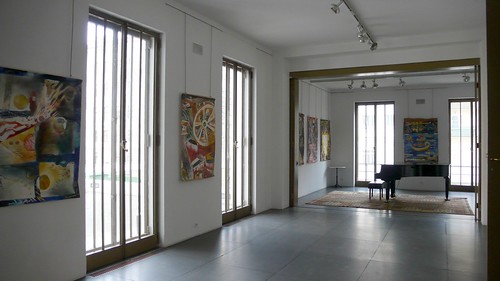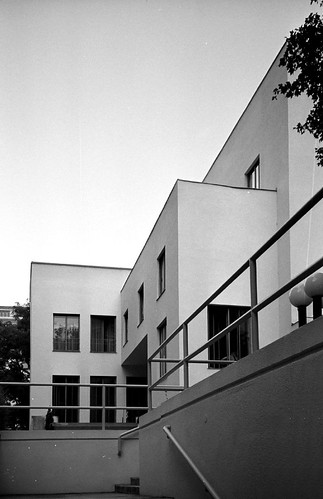 |
| Via Flickr: Ludwig designed every window, door, window-bar and radiator in the noblest proportions and with such exactitude that they might have been precision instruments. Then he forged ahead with his uncompromising energy, so that everything was actually manufactured with the same exactness. I can still hear the locksmith, who asked him with regard to a keyhole, "Tell me, Herr Ingenieur, is a mllimetre here really that important for you?" and even before he had finished the sentence, the loud, energetic "Ja", that almoust startled him." Excerpts from chapters V and Vi of Family Recollections; written by Hermine Wittgenstein in early 1940s, Originally uploaded by bg&emese |
 |
wittgensteinhaus |
Wittgenstein must have sized up language in relation with us when he wrote, Wovon man nicht sprechen kann, darüber muss man schweigen, which in translation reads, Whereof one cannot speak, thereof one must be silent or About what one can not speak, one must remain silent. Our world is over-filled with morphemes, of one sort or another, but that doesn't make it for more or better. I have suspected for some time now that silence could remedy the situation.
Thirty spokes meet in the hub.
Where wheel isn’t is where it’s useful.
Hollowed out, clay makes a pot.
Where the pot’s not is where it’s useful.
Cut doors and windows to make a room.
Where the room isn’t, there’s room for you.
So the profit in what is
is in the use of what isn’t.
Lao Tzu, Tao Te Ching, 500 bc
(from Le Guin, 1997: 14)
Recently I have discovered Valery Afanassiev, a Russian-born living in France who, among several other interesting preoccupations, plays piano. Here's an extended quote from this practitioner of one of few eternal languages, music.
Nowadays silence has become a rare phenomenon that is energetically set upon by various machines, machine guns and the twittering of human voices. Silence is out of our reach because we have forgotten how to listen to it. As if brushing it aside, we fill in the pauses that turn up here and there. Silence withdraws into itself, punishing us for our nonchalant scorn. The instrumentalists who opt for fast tempos seem to apprehend the absence of notes. All the time they move their fingers or vocal cords to sidestep the chasms at the bottom of which there lies the source of music, its eternal mystery. I often say that silence is the foundations of music. Recently I found a similar thought in a work of the writer who remains, however, beyond the scope of my usual readings—François Mauriac. I was not surprised in the least: my idea is perfectly banal. I am rather surprised that musicians do not express it in every interview. All you have to do is guard against any noise without stopping to listen to yourself and the world. And gradually music comes into existence.
Like nobody else, Emil Grigorievich [N.B. Gilels, another pianist] knew how to worship and handle silence. Even his way of speaking testified to this knowledge, for he often interrupted his speech to let the people around him meditate on what had been said and also listen to silence. Not only did he speak musically but music literally spoke through his voice, his manners, his thoughts, it never forsook him, not for an instant—a beautiful example of requited love. Even in his jokes one could hear music—something akin to the technique perlé which was one of his numerous fortes.
~
According to my Japanese friend, there has been no pianist like Emil Grigorievich in the history accessible to us. Indeed it is not difficult to reach such a conclusion upon analysing all available recordings. No pianist seems to have had such a command of the instrument, without insufficiencies and blind spots. One of the giants in this field, Arturo Benedetti Michelangeli, did not have the dynamic range comparable to what I heard once at the Big Conservatoire Hall. That night Emil Grigorievich rounded off his programme with Liszts Spanish Rhapsody. I have never heard such a forte either at the Conservatoire or elsewhere. Even the Berlin Philharmonic under Karajan's baton did not make the air resound so mightily. As for the use of the pedal, Gilels' only rival was again Michelangeli; and only Rachmaninov's recordings disclose to us the inner essence of rhythm so implacably, with the same determination. But, I repeat, no pianist has had at their disposal all these qualities: the refined pedal, an incomparable dynamic range that seemed to include both six pianos and six fortes, the divine sound that had no counterpart in nature, perlé, octaves, trills. I once asked Emil Grigorievich how to play trills. He said they should be played slowly: even in trills one should be able to hear silence, its serene, unruffled presence. Garrulous trills are obnoxious. The way Emil Grigorievich practised the instrument also reveals his intimate bond with silence. In contrast to Richter, who repeated the same passage over and over again, he never made his neighbours wonder, Will he ever drop with exhaustion? Whenever I go away from the piano and sit down on a divan to hear the piece I am learning with the inner ear, I remember my teacher, his habits, his sonorous silence. He taught me to hear not only music but also life itself; or rather, he taught me to hear music in life. I wish I could say there is nothing in the world except music. Whatever happens in it is music. Even death is music.
Some maintain that Gilels was above all a virtuoso. He was a virtuoso in the highest and noblest sense of the term, being different in this respect—in all respects that is—from contemporary virtuoso pianists, dubbed by promoters the athletes of the piano, who just play fast and have no inkling of how the instrument should sound and how to use the pedal. These so-called virtuosos are not acquainted with many components making up the notion of virtuoso playing. And since they violate silence as soon as they sit down at the piano—and before, and after—often their fast tempos produce no effect. What these spectacular tempos boil down to is a lump of notes you are supposed to like. These pianists do not listen to the music they perform and consequently hear no silence in it. One should play Gilels' recording of Chopin's Etude in F Minor, Opus 25, to learn what piano-listening amounts to, when demonstrated by a great pianist. And what about the way he listened to Mozart, Brahms and Grieg? Can one, upon the testimony of his recordings (and concerts), affirm that he was the greatest musician among pianists, all the more so if one put on the list of his composers Beethoven?
Many had the feeling that Emil Grigorievich was a restrained, unnatural person. But how could a man who played so naturally turn out to be unnatural in everyday life? Why confide in strangers anyway? Our drawn-out conversations which often lasted far into the night seemed to prove that I was no stranger to him. Does music depend on the ways and characters of the people who are professionally involved with it? Perhaps not: Wagner's example is sufficient to deter one from prying into composers lives. When prying into Gilels' life, however, one is sure to be struck by his natural approach to everyday events—as if his musical style were spreading around him. A lot can be said about his humanity, but I am prevented from doing so by his own modesty, by his unwillingness to display his generosity in public.
I cannot refrain, however, from revealing a story told by his son-in-law, Peter Nikitenko. Several times a year, Emil Grigorievich asked Peter to depose flowers on the tombs of the composers buried at the Novodevichye Cemetery in Moscow. I know several people who, upon arriving in a city they have never visited, rush towards the nearest cemetery: they are tomb collectors. But those who can hear cemeteries, their silence and music, are few and far between.
If a bell is struck, the sound reverberates into the distance. Similarly, if a point filled with mental energy is painted on a canvas (or a wall), it sends vibrations into the surrounding unpainted space...A work of art is a site where places of making and not making, painting and not painting, are linked so that they reverberate with each other (Lee Ufan).



No comments:
Post a Comment